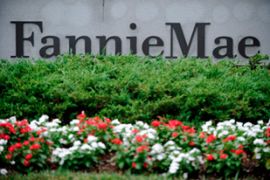Markets rise after US bail-out
But analysts say US government’s takeover of mortgage giants not sign of imminent recovery.

Bail-out beneficiaries
Allister Heath, the editor of the City AM newspaper in London, told Al Jazeera: “What it is preventing is a massive increase in interest rates in America and other countries in the world, at least in mortgage rates [and] a further collapse in the value of the assets of the global banking system.
“That in itself is not going to prevent matters from getting worse. It is not really going to sort out the global economy.”
The long-term beneficiaries of the costliest US bail-out ever are expected to be holders of the Freddie and Fannie bonds, which were trading a full percentage point above US Treasuries on Friday.
On Monday, they were in effect as safe as US government debt.
China and Japan, the biggest holders of the mortgage bonds, welcomed the bail-out.
“I think it will have a positive impact on the world economy as it eases worries over the US economy through more stable financial markets in the United States,” Bunmei Ibuki, Japan’s finance minister said.
Sameer Dossani, the director of 50 Years is Enough, a coalition of groups lobbying for major IMF and World Bank reforms, said the bail-out was “hypocritical”.
“What we have here is countries like the US using the nanny state to build up their own industries … and forbidding that option to developing countries.
“Countries like the US are kicking away the ladder that they themselves have climbed to development of success. It is hypocrisy.”
Banks rally
Global stocks also surged on news of the US bail-out.
European stock markets closed higher with London’s FTSE 100 blue chip index closing 3.92 per cent higher at 5,446 points despite technical problems which prevented trade for much of Monday.
In Paris the CAC 40 index was up 3.42 per cent at 4,340 points and in Frankfurt the DAX jumped 2.22 per cent to 6,263 points.
In New York, the Dow Jones industrial average closed up 290.18 points, or 2.59 per cent, at 11,510.49.
Shares in the Bank of America and Citigroup banks also both rose more than 6 per cent and were among the biggest drivers of gains on the Dow.
Asia the markets also rallied, with Japan’s benchmark Nikkei index closing 412 points, or 3.4 per cent, higher at 12,624.
Seoul’s Kospi index rose 5.2 percent, Hong Kong’s Hang Seng index advanced 4.3 per cent and Singapore’s Straits Times Index jumped 4.7 per cent.
Key indexes in Australia and Taiwan also rose.
Paul Schulte, a regional strategist with Lehman Brothers in Hong Kong, told the Reuters news agency that the US move had taken some of the risk out of the market.
“So in that sense this is good for other financial assets – you have reduced systemic default risk,” he said.
‘Too vulnerable’
But he also warned that “longer-term we have a lot more glass to crawl over because we have arrangements with other financial institutions that need to get worked out”.
The US government on Sunday seized control of Fannie Mae and Freddie Mac, which own or guarantee almost half of all US mortgages, ending weeks of speculation after regulators judged the companies’ shrinking capital position left them too vulnerable.
As part of the plan, the treasury is taking an equity stake in the companies and promised to purchase mortgage-backed securities they issue and provide however much liquidity is necessary to keep them afloat – actions that could cost $200bn.
But Citigroup analysts said that the longer Washington increases its debt to essentially restructure the housing market, the more the dollar and US assets in general would be seen in a negative light.
Financial firms have posted over $500 billion in credit losses and write-downs since credit markets seized-up a year ago following defaults on US home loans.